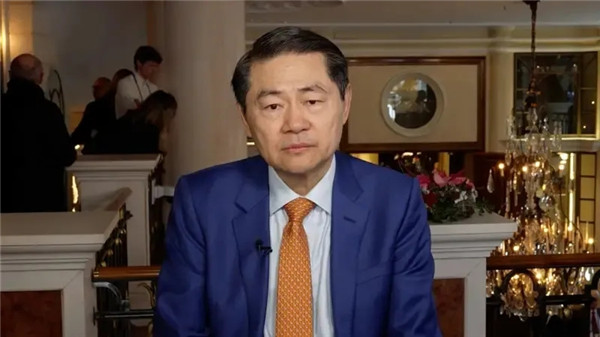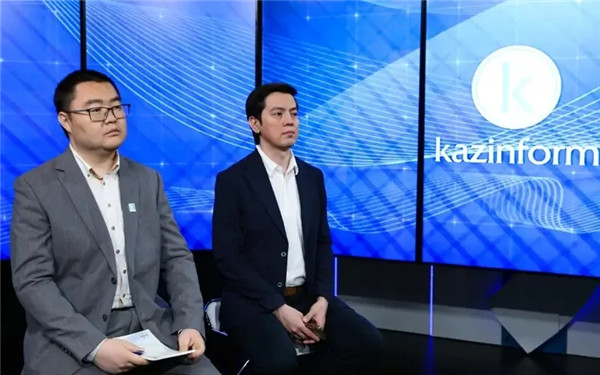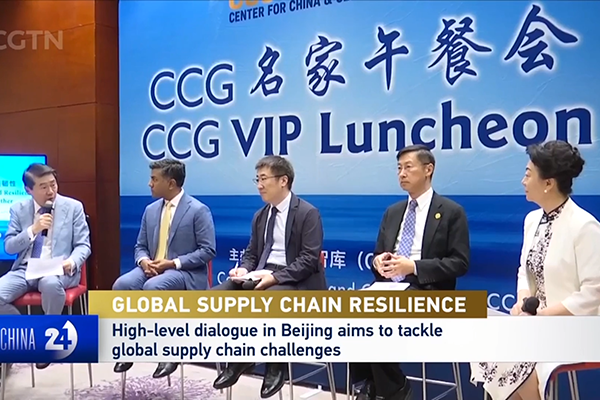KNA | Global trade, U.S.-China tensions, AI regulation
February 19 , 2025
Exclusively for Kazinform News Agency, Dr. Wang Huiyao, the Founder and President of the Center for China and Globalization, discussed the impact of U.S. economic decisions on global trade, the need for reforms in international politics, and China’s role in regulating artificial intelligence.

In light of the recent decisions by U.S. President Donald Trump regarding tariffs, including those on Chinese products, what changes do you expect in global trade? Will these changes be significant? Do you expect a compromise to emerge? After all, neither Washington nor Beijing benefits from such a harsh trade war.
I think that President Trump, now that he’s been in office for almost a month, is trying to start rebalancing trade with the rest of the world. His first term was on China, but now he’s targeting everybody. In the short run, I think this is going to hurt the global economy because it will create disruption, a chaotic situation, and a huge adjustment.
In the long run, I think this will actually isolate the U.S. and encourage more countries to trade among themselves. So, while this policy may not work, it likely needs to address some of the imbalances. Particularly for China and the U.S., it will be very unproductive if the two countries get into a trade war.
I think it has already been shown during the first term that China has withstood this pressure. In fact, China-U.S. trade has even increased compared to the first term. So I think the U.S. is using this as a vehicle to push for more talks, which is fine. You know, China is not afraid of talking, and we can talk.
We can address all these issues. Let’s make some deals—reciprocal and beneficial ones. Let’s stop the trade tariffs. In the long run, if we can sit down and come up with win-win solutions, it could be better for China, the U.S., and the world.
Let’s not obsess over ideological narratives like autocracy versus democracy or build up geopolitical alliances like AUKUS, Quad, or Camp David. Instead, let’s focus more on the economy—CPTPP, RCEP, or even WTO—and work on reforms. In the long run, we have to solve these issues, but in the short term, it is going to be very chaotic.
The issue of tariffs coincided with the intensification of political tensions in Europe. In Germany, things are not so clear ahead of the parliamentary elections, and in France, the economic crisis has been exacerbated by frequent changes in government… Given this, what is your forecast for the euro? Especially considering that NATO member countries will have to increase defense spending. Will the EU be able to maintain its external obligations amid growing dissatisfaction with the economic situation within the member states?
Well, I think the European Union is certainly going to face a hard time ahead, with the wars still not finished, Trump pushing them to raise the defense budget, slowing economies, and an unclear political landscape. Germany and France may have unstable governments, which will create a lot of problems.
In that sense, I think the European Union needs to be more strategic, independent, and really carve out a space between China and the U.S. What Trump is doing, including his desire to take over Greenland, is going to put a lot of geopolitical pressure on European countries. So this is a good time for the EU to improve relations with China, the rest of the world, and the Global South, rather than follow up too closely with the US, where US said China is a strategic rivalry, and European countries said China is a systematic rivalry.
I think that kind of approach is no longer feasible. Furthermore, I think China and the EU should strengthen economic cooperation. Now is probably a good time to revive and restore the EU-China Comprehensive Investment Treaty, which has been on hold for several years. There is a lot of potential for the EU and China to collaborate during this difficult time.
After all, the EU remains one of the largest economies in the world. China and the EU should work together to sustain the turbulent times ahead of us.
Since the beginning of the year, mainstream media has been focused on Donald Trump and his decisions. How do you assess his statements regarding the Gaza Strip? How serious is Washington in its intention to take control of Gaza?
Well, I think what President Trump said is probably true, and the thing is that we need balance in the world. I mean, China is the largest trading partner of the Gulf countries and many Middle Eastern countries, and of course, it also has a huge economic influence there. So I don’t think it’s a good idea to relocate 2 million Palestinians from Gaza to other countries, as that could create chaos.
But China, as one of the P5 member countries of the U.N., along with the EU and many other countries, can provide a balanced view on what the U.S. has been proposing. I think the EU is against the relocation of Palestinians from Gaza, and China, of course, is also against it. Let’s stick to the two-state solution for Palestine, which all countries have agreed on in the past, and let’s really do that.
China serves as an important counterbalance to this unilateral approach by the United States. China is also a great friend of the Gulf and Middle Eastern countries. With our 14 factions of Palestinians, we could really provide some constructive ideas. China could also help reconstruct Gaza with its extensive infrastructure-building capacity, as well as contribute to rebuilding Ukraine.
I think Chinese involvement in a peaceful Middle East transition, supporting the true two-state solution together with the EU and many other countries, including BRICS, will be very important. We should not allow unilateralism by just one country to dominate the future of thousands of Palestinians.

AI has become a central point of competition between major global powers. Many countries are now implementing measures to regulate and control AI development. For instance, we know that the European Union has introduced a new law to regulate AI systems. How do you think these measures will be effective in regulating and controlling AI?
Yes, I just came from the AI Summit in Paris. I think AI is something that we have to either develop or regulate together on an international level. We are already dealing with climate change, now we have AI, and we have global debt. Unilateralism is not going to work in this global village—we are all on one Earth, one planet.
AI is a double-edged sword. It can be good or bad, depending on how we govern and regulate it. China, France, the EU, and India have signed an AI declaration in Paris, whereas the U.S. and the UK did not. I think this already shows a divide, but it is not based on ideology or political systems, but based on the common understanding for the global future governance of AI, which I think is a good way of doing this.
We should convince the U.S. and the UK to join the AI declaration, and we need to create a new global system for AI governance. In this sense, China, France, India, the EU, and many other countries should work together, including the U.S. and the UK. I think this is a good start, but let’s continue to work together.
China has been making significant advancements in AI, developing systems such as DeepSeek, which in some areas already surpass some Western counterparts like ChatGPT. What do you see as the next steps for China in AI development?
Yes, I think AI is really a powerful tool for mankind to master. But we have to do it in a better way and more economically cost-effective way. So the DeepSeek model that a Chinese company is innovating is a breakthrough, it’s a revolutionary new phenomenon for the AI area. It provides open sources, it’s an open system, it’s much more economic, it’s cost-effective, it’s just a fraction of the cost.
It breaks the monopoly of the major AI companies in the West, particularly in the U.S. It creates more opportunities for developing countries to master AI technology in the future. It shows that it’s possible to develop powerful AI tools on a small budget, tools just as effective as those developed with billions, if not trillions, of dollars.
So, I think it’s very significant. I think this paved the way for a future at a much larger scale, particularly for Global South countries, for developing countries, to master AI, to harness AI power for the future benefit of mankind. But also, it provides healthy competition. So that’s why you see all the AI companies welcome that.
It’s a healthy AI competition, but China, as one of the largest AI hubs, has the world’s largest pool of AI talent. Each year, 30 million students graduate from Chinese universities, with half specializing in science and engineering. China has an abundance of AI expertise, and many AI experts in the U.S. also come from China. I believe there are many opportunities for collaboration between China, the U.S., the EU, and the Global South to make AI accessible to all countries and people, but also in a better way to use it.
So, I think this DeepSeek is a revolutionary breakthrough in the AI area, and that really shows that we’re going to have a brighter future for AI in the future.

Another interesting development is a collaboration between Apple and Alibaba in AI development for iPhone in China. What does this partnership signify for Chinese tech market and the global market as well?
No, I think this is good news. I mean, China and Apple are partnering with Alibaba to develop AI for phones, which is very good. Apple is the largest phone producer in the world, with 80–90% of iPhones made in China. So if Alibaba can be a partner, an AI partner, I’m sure iPhones will continue to have a big market share in China and globally as well.
So this is good news. This shows how the U.S. and China, despite their differences, can still work together—two of the largest companies in the AI sector. So I hope that TikTok can be accepted in China. We also hope that Google, X can come to China. Let’s really relax the control, open up to each other, and have better collaboration between China, the U.S., and the rest of the world.
From Kazinform News Agency, 2025-2-19






